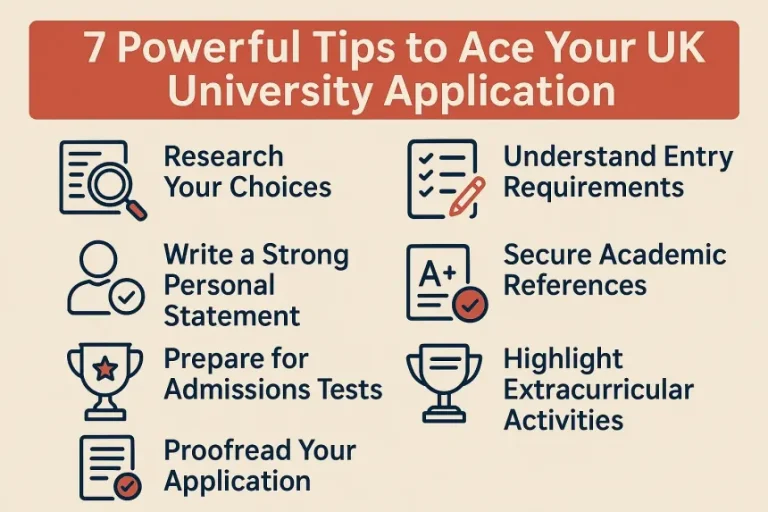Choosing the right UK University for Study feels overwhelming when you’re bombarded with conflicting advice, endless ranking lists, and pressure to make the “perfect” decision. You’ve probably spent hours comparing league tables, only to realize they don’t tell you what student life actually feels like or whether you’ll land your dream job after graduation.
Here’s the truth: rankings only scratch the surface. The university that’s ranked #10 might be perfect for your career goals, budget, and learning style, while the #3-ranked institution could leave you struggling financially or culturally isolated.
This comprehensive guide reveals 10 crucial factors beyond rankings that will help you make an informed decision about your UK university education. By the end, you’ll know exactly how to evaluate costs realistically, assess cultural fit, understand career outcomes, and explore modern options like hybrid study programs and flexible international education that could transform your university experience.
Why University Rankings Don’t Tell the Whole Story
Before diving into our 10 factors, let’s address why rankings fall short. According to data from the Higher Education Statistics Agency (HESA), student satisfaction varies dramatically even within top-ranked institutions. The National Student Survey reveals that some universities ranked outside the top 20 consistently outperform prestigious institutions in specific subject areas and student experience metrics.
University rankings typically focus on research output, staff-to-student ratios, and international reputation. While important, these metrics don’t capture what matters most to your daily experience: teaching quality in your specific program, career support services, cost of living, or whether the campus culture aligns with your values.
1. Total Cost of Education (Beyond Tuition Fees)
Understanding the Real Financial Picture
Tuition fees are just the beginning. According to GOV.UK data, international students face additional costs that can double their total education expense. Here’s what you need to calculate:
Direct Educational Costs:
- Tuition fees (£10,000-£38,000+ annually for international students)
- Application fees (£22-£26.50 per UCAS application)
- Visa fees (£363 for student visa applications)
- Immigration Health Surcharge (£624 per year)
Living Expenses by Region:
- London: £1,265+ per month
- Other major cities: £1,015+ per month
- Smaller cities: £820+ per month
Hidden Costs Often Overlooked:
- Textbooks and materials: £300-£500 annually
- Technology requirements: £500-£1,200
- Student union membership and activities
- Travel costs (home visits, field trips)
- Professional development and networking events
Smart Financial Planning Strategies
Research universities offering payment plans, scholarships specifically for your nationality, and work-study opportunities. Some institutions provide guaranteed accommodation for international students, which can significantly impact your housing costs and planning certainty.
2. Location and Cost of Living Analysis
Regional Cost Variations
The Office for National Statistics reports substantial cost differences across UK regions. Your university’s location directly impacts your quality of life and financial sustainability.
High-Cost Areas (London, Oxford, Cambridge):
- Accommodation: £150-£300+ per week
- Food: £40-£60 per week
- Transport: £30-£50 per week
Moderate-Cost Areas (Manchester, Birmingham, Edinburgh):
- Accommodation: £90-£150 per week
- Food: £30-£45 per week
- Transport: £15-£25 per week
Lower-Cost Areas (Newcastle, Sheffield, Cardiff):
- Accommodation: £70-£120 per week
- Food: £25-£35 per week
- Transport: £10-£20 per week
Evaluating Location Benefits Beyond Cost
Consider proximity to your industry’s hub, internship opportunities, part-time work availability, and cultural attractions that align with your interests. A slightly higher cost of living might be justified by better career prospects or quality of life improvements.
3. Program Structure and Teaching Quality
Today’s higher education landscape offers unprecedented flexibility through hybrid study programs and online study abroad components. These options provide:
Hybrid Study Programs Benefits:
- Combine in-person networking with online flexibility
- Reduced accommodation costs during online periods
- Access to international guest lecturers
- Ability to maintain part-time work or internships
Flexible International Education Options:
- Study abroad semesters without full program transfer
- Joint degree programs with international partners
- Virtual international collaboration projects
- Digital learning resources from global institutions
Assessing Teaching Excellence
Look beyond student-to-faculty ratios. Research:
- Teaching awards won by faculty members
- Industry connections and guest lecturer programs
- Practical learning opportunities (labs, workshops, internships)
- Technology integration in curriculum delivery
- Assessment methods that match your learning style
4. Cultural Fit and Campus Environment
Understanding Campus Culture
University culture significantly impacts your academic success and personal development. According to student experience surveys, cultural misalignment is a leading cause of academic underperformance and mental health challenges among international students.
Key Cultural Factors to Evaluate:
International Student Integration:
- Percentage of international students (aim for 15-30% for optimal balance)
- Dedicated international student support services
- Cultural societies and clubs
- Mentorship programs pairing international and domestic students
Learning Environment:
- Collaborative vs. competitive academic culture
- Emphasis on independent study vs. guided learning
- Participation expectations in seminars and discussions
- Work-life balance promoted by the institution
Social Opportunities:
- Active student union with diverse societies
- Sports and recreational facilities
- Cultural events and festivals
- Volunteer and community engagement programs
Assessing Cultural Compatibility
Visit campuses when possible, attend virtual information sessions, connect with current students through social media, and research student testimonials beyond official marketing materials.
5. Career Services and Industry Connections
Comprehensive Career Support Evaluation
Graduate employability statistics only tell part of the career story. According to Graduate Outcomes Survey data from HESA, career services quality varies dramatically between institutions, even those with similar employment rates.
Essential Career Services:
- Dedicated career advisors for international students
- Industry-specific career guidance
- CV and interview preparation workshops
- Professional networking events
- Alumni mentorship programs
Industry Partnership Indicators:
- Companies regularly recruiting on campus
- Internship placement rates and partner organizations
- Industry advisory boards influencing curriculum
- Guest speakers from your target industry
- Collaborative research projects with industry partners
Long-term Career Planning Support
Investigate post-graduation support services, alumni networks in your home country or target work location, and ongoing professional development opportunities. Some universities offer career services access for several years after graduation.
6. Faculty Expertise and Research Opportunities
Beyond Academic Credentials
Faculty quality impacts your learning experience through research supervision, industry insights, and networking opportunities.
Faculty Evaluation Criteria:
- Recent publications in your field of interest
- Industry experience and consulting work
- International collaborations and recognition
- Accessibility and mentorship approach
- Research opportunities for undergraduate and graduate students
Research Participation Benefits:
- Enhanced graduate school applications
- Publication opportunities
- Conference presentation experience
- Direct faculty mentorship
- Industry problem-solving experience
Maximizing Faculty Relationships
Research faculty members’ work before applying, express genuine interest in their research during interviews, and actively participate in research opportunities throughout your studies.
7. Student Support Services
Comprehensive Support Infrastructure
International students face unique challenges requiring specialized support systems. According to Universities UK International data, robust support services significantly improve student satisfaction and academic outcomes.
Academic Support Services:
- Writing centers and academic skills workshops
- Subject-specific tutoring programs
- Study groups and peer learning opportunities
- Disability support services
- Academic accommodations for international students
Personal Wellbeing Support:
- Mental health counseling services
- International student advisors
- Financial counseling and emergency assistance
- Healthcare guidance and insurance support
- Legal advice for visa and employment issues
Integration and Social Support:
- Orientation programs extending beyond first week
- Cultural adjustment workshops
- Language support programs
- Buddy systems and peer mentorship
- Regular social events and community building activities
Evaluating Service Quality
Research response times for support requests, read student reviews of services, inquire about service availability during weekends and holidays, and understand how to access emergency support.
8. Accommodation Options and Campus Life
Housing Security and Quality
Accommodation significantly impacts your university experience, academic performance, and financial planning. University-provided housing offers advantages for international students, including guaranteed placement, inclusive utilities, and built-in community connections.
Accommodation Types to Consider:
- University halls of residence
- Private student accommodation
- Shared housing arrangements
- Homestay programs
- International student housing cooperatives
Quality and Safety Factors:
- Room types and amenities included
- Kitchen and bathroom sharing arrangements
- Internet connectivity and study spaces
- Safety and security measures
- Proximity to campus and transport links
Campus Life Enhancement
Active campus life contributes to personal development, networking opportunities, and overall satisfaction. Research:
- Student societies aligned with your interests
- Sports facilities and intramural programs
- Cultural and entertainment venues on campus
- Student government participation opportunities
- Community service and volunteer programs
9. Technology Infrastructure and Digital Resources
Modern Learning Technology
Digital infrastructure quality affects your daily academic experience, especially with increasing hybrid study programs and online study abroad components.
Technology Evaluation Checklist:
- Campus-wide WiFi coverage and speed
- Library digital resources and database access
- Learning management system functionality
- Virtual classroom capabilities
- Technical support availability and response times
Digital Learning Resources:
- Online library access from off-campus locations
- Virtual reality and simulation laboratories
- Collaboration tools for group projects
- Mobile app integration for campus services
- Tech equipment lending programs
Future-Proofing Your Education
Consider how well the university adapts to technological changes, invests in educational technology, and prepares students for digital workplace requirements.
10. Alumni Network and Long-term Value
Alumni Network Assessment
A strong alumni network provides ongoing career benefits, mentorship opportunities, and professional connections that extend far beyond graduation.
Alumni Network Evaluation:
- Geographic distribution of alumni
- Industry representation in your field
- Active alumni associations and chapters
- Mentorship program availability
- Alumni recruitment and hiring practices
Long-term Value Indicators:
- Graduate salary progression over 5-10 years
- Alumni advancement to leadership positions
- International career mobility success
- Entrepreneurship and startup success rates
- Continuing education and professional development support
Maximizing Alumni Connections
Engage with alumni during your studies through informational interviews, networking events, and mentorship programs. Many universities maintain alumni databases accessible to current students for networking purposes.
Making Your Final Decision: A Strategic Approach
Step-by-Step Decision Framework
Step 1: Create Your Priority Matrix Weight each factor based on your personal priorities, career goals, and circumstances. Not all factors carry equal importance for every student.
Step 2: Conduct Detailed Research Gather specific data for each university on your shortlist across all 10 factors. Use official university data, government statistics, and verified student reviews.
Step 3: Financial Reality Check Calculate total costs including living expenses, create a realistic budget, and identify funding sources. Ensure your financial plan accounts for unexpected expenses.
Step 4: Visit or Connect Virtually Attend virtual open days, connect with current students, and if possible, visit campuses to get a genuine feel for the environment.
Step 5: Trust Your Instincts After thorough research, consider which university feels right for your personality, learning style, and long-term goals.
The Future of UK Higher Education: Embracing Flexibility
Emerging Trends in International Education
The landscape of UK higher education continues evolving with flexible international education options becoming increasingly popular:
Hybrid Learning Models: Universities are developing programs that combine on-campus intensity with online flexibility, allowing students to optimize their living costs while maintaining academic quality.
Global Campus Networks: Some UK universities offer programs across multiple countries, providing international experience without full relocation costs.
Micro-Credentials and Stackable Degrees: Flexible qualification pathways allow students to build expertise gradually while working or managing other commitments.
Preparing for Your UK University Journey
Remember that choosing the right university is about finding the best fit for your unique situation, not following generic rankings. The factors outlined in this guide will help you make an informed decision that supports both your immediate academic goals and long-term career aspirations.
Your university experience extends far beyond classrooms and lecture halls. The right choice will provide academic excellence, personal growth opportunities, cultural enrichment, and the foundation for your future career success.
Take the Next Step in Your UK University for Study Journey
Choosing the right UK University for Study requires careful consideration of multiple factors beyond rankings. From understanding total costs and cultural fit to exploring modern options like hybrid study programs and flexible international education, your decision should align with your personal goals, financial situation, and learning preferences.
Ready to secure your ideal student accommodation near your chosen UK university? Book a free consultation with Uninist today to explore verified, quality student housing options across the UK. Our expert team understands the unique needs of international students and can help you find accommodation that supports your academic success and enhances your university experience.
Visit Uninist Student Residences page to discover your perfect student home and take the first step toward an unforgettable UK university journey.
FAQ
What factors should I consider beyond university rankings when choosing a UK university?
Consider total education costs, location and living expenses, program structure including hybrid study programs, cultural fit, career services quality, faculty expertise, student support systems, accommodation options, technology infrastructure, and alumni networks. Rankings don’t reflect personal compatibility or practical considerations that impact your daily university experience and long-term success.
How much does it really cost to study at a UK university as an international student?
Beyond tuition fees (£10,000-£38,000+ annually), budget for visa fees (£363), Immigration Health Surcharge (£624/year), accommodation (£70-£300/week depending on location), food (£25-£60/week), and hidden costs like textbooks, technology, and travel. Total annual costs typically range from £25,000-£55,000 depending on your chosen city and lifestyle.
Which UK cities offer the best value for money for international students?
Cities like Newcastle, Sheffield, Cardiff, and Manchester offer excellent value with lower living costs (£70-£150/week accommodation) while maintaining quality education and career opportunities. London and Oxford are expensive (£150-£300+/week) but offer extensive networking and industry connections that may justify higher costs for certain career paths.
Are hybrid study programs and online study abroad options worth considering in the UK?
Yes, hybrid study programs combine in-person networking with online flexibility, potentially reducing accommodation costs while maintaining academic quality. These flexible international education formats allow part-time work, provide access to international guest lecturers, and offer modern learning approaches that many employers now value in graduates.
How do I assess if a UK university’s culture will be a good fit for me?
Research the international student percentage (ideal 15-30%), available cultural societies, mentorship programs, and campus social opportunities. Connect with current students through social media, attend virtual information sessions, and evaluate whether the learning environment (collaborative vs. competitive) matches your preferred study style and personal values.
What career services should I expect from a quality UK university?
Look for dedicated international student career advisors, industry-specific guidance, CV and interview preparation, regular networking events, active alumni mentorship programs, and strong industry partnerships. Quality universities maintain relationships with employers who actively recruit on campus and offer ongoing career support even after graduation.
How important is faculty expertise when choosing my UK university program?
Faculty expertise directly impacts your learning through research supervision, industry insights, and professional networking opportunities. Research professors’ recent publications, industry experience, international collaborations, and accessibility for mentorship. Active researchers often provide undergraduate research opportunities that enhance graduate school applications and career prospects.
What student support services are essential for international students in the UK?
Essential services include academic support (writing centers, tutoring), personal wellbeing support (mental health counseling, international student advisors), integration programs (orientation, cultural adjustment workshops, buddy systems), and practical assistance (financial counseling, visa guidance, healthcare support). Quality support significantly improves academic outcomes and personal satisfaction.
Should I prioritize university accommodation or private housing in the UK?
University accommodation offers guaranteed placement, inclusive utilities, built-in community connections, and simplified logistics for international students. While sometimes more expensive, it provides security and support systems crucial for successful adaptation. Private housing offers more independence but requires local knowledge and carries additional responsibilities and potential risks.
How can I evaluate the long-term value and alumni network of a UK university?
Research alumni geographic distribution, industry representation in your field, active alumni associations, mentorship program availability, and graduates’ career progression over 5-10 years. Strong networks provide ongoing career benefits, international connections, and professional development opportunities. Connect with alumni through university databases and LinkedIn before making your decision.








